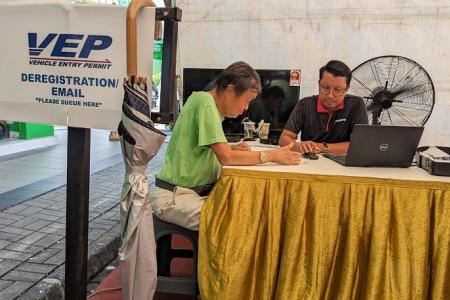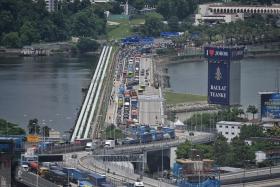S'pore drivers unconvinced they can enter M'sia without VEP
Motorists from Singapore continued to throng the TCSens centre in Danga Bay on Sept 28 to secure a Vehicle Entry Permit (VEP), despite assurances that they can still enter Malaysia from Oct 1 without one.
Drivers whom The Straits Times spoke to were fraught with worry and uncertainty despite clarification on Sept 27 from Malaysia’s Road Transport Department (JPJ) that they will be allowed into Johor even if they do not have VEP tags.
However, the agency, which is responsible for the enforcement of the VEP, said motorists will be given reminders to register, install and activate their radio frequency identification (RFID) tags upon entering Johor’s two land checkpoints as enforcement is implemented in phases.
They can also be given a warning when they leave Malaysia, along with reminders to install the tags as soon as possible.
Many motorists, however, were unconvinced about the leeway given to them if they were to drive to Johor without a VEP.
Ms Loi Mei, who is in her 50s, said she was at Danga Bay to find out whether her tag had been mailed to her. She added that she has been waiting for weeks, way past the 10 working days she was told it would take for the VEP to reach her.
She said: “What does warning mean? Are you going to warn me once, twice? What if I need to come into JB every week? Am I going to accumulate all the warnings into a fine?”
Civil servant Simon Lim, who declined to give his age, also voiced his frustration.
He said: “We are doing something; we submitted documents, asked for advice, but there was no reply. The ball is not in our court.
“So, if you want to issue me a warning for things that are not our fault, it’s not right.”
In May, the Malaysian government said foreign vehicles must have the VEP tag installed by Oct 1. Motorists who fail to do so can face fines of up to RM2,000 (S$620) or risk being barred from Malaysia.
The VEP allows the government to track traffic records, including summonses and offences, of foreign-registered vehicles.
A total of 62,635 Singapore-registered private vehicles have activated their VEPs as at Sept 25, JPJ said.
The department said about 130,000 more VEP-RFID tags are expected to be issued in the coming weeks, with 90,000 already registered, Malaysian daily The Star reported on Sept 29.
Civil servant Melvin Ng, 30, who drives a second-hand car, said he gave up applying for the VEP after making multiple unsuccessful attempts to register a change of vehicle ownership.
He said: “Although the Malaysian government recently said foreign-registered vehicles without VEPs can still enter the country, I will not do it. How many warnings and reminders can one get before enforcement actions are taken?”
Salesman Alan Png, 40, who was attempting to deregister the VEP account linked to his used car’s previous owner, said he was at first relieved that there was no need to rush to meet the Oct 1 deadline, but he still wanted to get his tag sorted out.
“You never know when the government will change policies again; better to get it settled and done with,” he said.
Many motorists who showed up at the VEP centre made sure to get there in the early hours or opted to book hotel rooms in the area to join the queue early.
On Sept 28, the first person in the line for VEP applications was security services driver Muhamad Erfaq, who arrived at Danga Bay at about 3am, after three unfruitful visits in the past when he had to join snaking queues.
When the TCSens centre opened at 9am on Sept 28, dozens in the queue were told they were at the wrong centre. Instead, they were told to go to one of the other two JPJ spots – in Taman Daya and Larkin – set up for the collection and installation of VEP-RFID tags until Sept 30.
There were mutterings about the “slow” dissemination of information. One angry driver protested loudly as he left to collect his tag, despite his appointment slip listing the appointment location as Danga Bay.
Although many Singaporeans head to Johor Bahru for leisure to take advantage of the favourable currency exchange rate for food, groceries and petrol, there are others with business interests in Johor who are anxious about getting their tags before Oct 1.
Entrepreneur Sam Chua, 49, who is in the process of setting up a Johor branch for his water purifier business, said he needs to travel to JB to interview a job applicant next week. He will also need to go north up to twice a week when it is time to train his new team.
Although he is not keen on getting a warning, he said he will have no choice but to stick to his travel plans, with or without the VEP.
Other motorists said they have faced other issues in each step of applying for the VEP, including registering online and getting documents verified, as well as collecting and installing the tag, and getting it activated.
Early adopters like web platform tester Angela Tan, 51, whose 2019-approved VEP expired in July 2024, renewed her permit but found that her e-wallet was linked to her old tag. This meant she had to tap her Touch ‘n Go card at the JB land checkpoint to pay the road charge and toll, instead of the charges being deducted automatically from the e-wallet.
The TCSens centre, which has been handling the bulk of VEP inquiries, has hired more people to fill its eight counters that deal with walk-in inquiries.
Operation hours have also been extended from 5pm to 9pm or later to deal with the rush to meet the Oct 1 deadline.
Before the Sept 27 announcement, most cross-border taxi drivers and private transport operators said they had not seen a bump in inquiries for trips between Singapore and Malaysia.
Only one firm said it has seen an increase in inquiries since the start of the week, from people without VEPs looking for alternative transport to cross the border.
“We usually receive one to five inquiries for our cross-border services daily, but we’ve been seeing more of such inquiries this week,” said the spokesperson.
Get The New Paper on your phone with the free TNP app. Download from the Apple App Store or Google Play Store now


